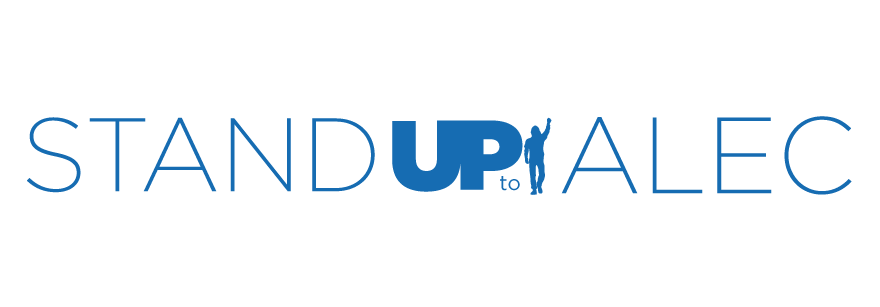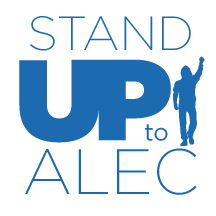ENGAGING THE PRESS
If you’ve decided that after reaching out to your legislator’s office that they aren’t going to leave ALEC, it’s time to escalate your efforts and put together a press event.
PREPARATION
Find a time and date that works for the largest group of community members – One of the first things that a reporter is going to consider when they ask themselves if something is newsworthy is “how many people” are going to be there. Crowd size is an indicator to reporters of the INTENSITY of a specific issue. You should hope to attract between 15-25 people.
Find a location that makes the most sense – The easiest way to do this would be to try and do it in front of the legislators official or campaign office. Since sometimes legislators don’t have official or campaign offices, you might want to choose a location that has symbolic meaning to the legislator: Consider doing it in front of their place of business, or consider doing it outside of a public event that they have scheduled.
Be mindful of logistics and permitting before a press event – Different spaces have different rules governing their use. For instance, there might be a public park across from your legislators office. Call the parks department and find out if you need a permit to hold a ‘free speech’ event there. The same goes for the rules governing public easements such as sidewalks or grass abutments. Usually these things are fairly free and easy to both find out, and if a permit is necessary, almost always can be gotten quickly and at a low cost.
Consider the weather – Is it winter or rainy? Perhaps you should do it indoors. Is it sunny and hot? Bring cold water for your guests and participants.
Keep the press event to between 30 minutes and 45 minutes INCLUDING questions – Be mindful that shorter and tighter is more powerful. Local press is incredible strapped for time and resources. If you can ensure that a reporter gets statements, crowd reactions, compelling b-roll of the crowd and can be in and out in an hour, you stand a much better chance of attracting press to the event.
Recruit a community leader to speak – Having a noted community leader, from the faith community, civil rights community or other is a great way to attract press attention. One thing to try and stay away from, though, is another candidate for office.
Make sure the other speakers are diverse – If your community leader is speaking from the perspective of the community that he/she comes out of, make sure your other speakers can bring the perspective of other communities affected.
Keep speaking program to a max of 30 minutes; have an Emcee – Your speaking program should factor in one minute of introducing a speaker, 2-3 minutes of speaking per speaker and about 1 minute of “overage time” in order to account for the fact that some folks will go over their allotment. That gives you a total of 5 minutes per speaker and a max of 6 speakers at the event. Each of the speakers should have a “call to action” in their remarks directed at the politician. You should also have an Emcee who starts the program, introduces the speakers and manages the questions from reporters.
Send a press advisory a few times before the event – Typically before a press event, we send a press advisory about the event 48 hours before, 24 hours before and the morning of an event.
Make personal press calls – An email can be ignored, a phone call is much more difficult to ignore. The day before a press event, call the press you’ve invited and tell them about the event, what you hope to accomplish, how many people will be there, who will be speaking and what the reporter is likely to see and who they will be able to talk to. We recommend a first call the day before and followed up with a reminder call a few hours before the start of the event.
Have a podium – Trust us, a podium makes everything feel more official. It gives you something to tape a sign to, gives your speakers something to hold on to or put their remarks on and gives you a place to put your phone so you can record the speakers (you can share these on your social media accounts later).
THE PRESS EVENT
Get there early to set up – If the press event is scheduled for noon, get there at 11:30, make sure that your group arrives by 11:50 and be prepared to start between 12:00 and 12:05.
Have a ‘huddle’ with the speakers – 10 minutes or so before the start, your Emcee should have all the speakers get together to go over how the program will work. The Emcee should go over the agenda, ask the speakers if there are any last minute changes to their remarks.
Make sure someone is in charge of handling press – Give one volunteer the job of checking the press in, checking in on them to see if they need anything throughout the event and asking them if they would like to do one-on-one interviews.
Have a press packet written and handy – Make sure you have some materials to put in press’ hands. It should include a one pager on ALEC, your legislator’s ALEC ties and a press release with quotes from the speakers that they can use.
ALL YOUR MEMBERS SHOULD HAVE A SOCIAL MEDIA ROLE – Your attendees shouldn’t just be there to clap or chant or hold signs – find out who is most comfortable doing what and have them use their preferred social media channel to get the word out. You might want to have a few people livetweeting, others posting photos on Instagram, several others should be streaming on Facebook Live the event from different perspectives and offering commentary and answering questions. REGARDLESS OF MEDIUM, MAKE SURE YOU HAVE AGREED TO A HASHTAG FOR THE EVENT AND HOLD EVERYONE TO USING IT.
AFTER THE PRESS EVENT
Reach back out to press who attended – Find out if they need any additional materials, see if they got what they needed or whether they want more information. Find out if they are writing or producing a segment.
Send press materials to your full press list – Make sure that regardless of whether or not press attends, they get your materials. They might write after the fact or seek more information.
Send recordings to radio stations – If you have recordings of the event, Radio stations can take bits of your speakers’ statements and craft a short story around what you provide them.
Draft letters to the editor and op-eds about the event – Remember, events are good but follow ups are better. Make sure that folks submit letters to the editor and op-eds about the event to local papers and online.
Reach back out to your legislator’s office – After the event, let your legislator know that you are only interested in them doing the right thing, you want them to drop ALEC and to say that they will no longer participate.

